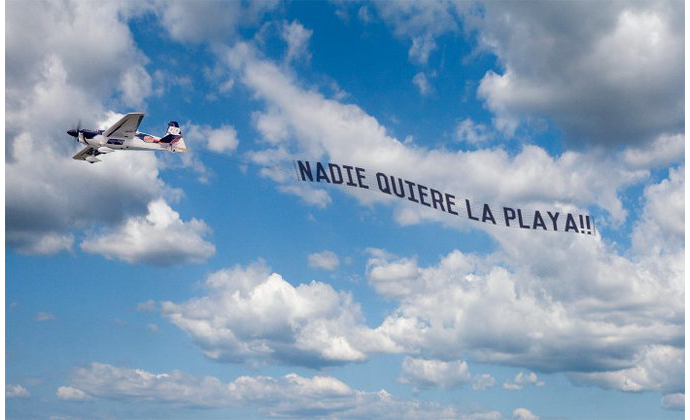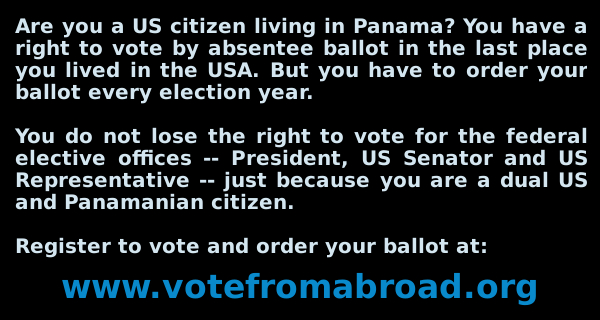Fábrega’s folly — but other than his party’s retainers, look at who else likes the idea. Of course, the sand miners who would periodically replace the washed-away beach, and associated public works construction contractors. And business organizations, at the behest of those with empty condos across from the Cinta Costera that they want to sell. If the Panamanian Society of Engineers and Architects (SPIA) says that an artificial beach on polluted Panama Bay is too stupid an idea to merit their attention, hey, the Chamber of Commerce and the Panamanian Business Executives Association (APDE) would bring in foreign engineers to testify to the sanity of the mayor’s pet project. Unattributed photo from Miguel Antonio Bernal’s Twitter feed.
Business groups pushing the envelope against resistance
by Eric Jackson
The European Union has once again blacklisted Panama as a financial haven for its tax cheats and thugs. The Chamber of Commerce and the business executives’ association, bogged down over their uninspiring and unpopular proposals for constitutional change, press ahead with support for two new and immediately scorned projects: an artificial beach in front of the Cinta Costera and a huge expansion in permission for foreign professional and managerial people to work in Panama.
There are a lot of stereotypes about Panama and its business scene that may have once been true but are much less true now. The whole “completely objective journalism, with just the facts” notion studiously ignores the fact that which data are important is a matter of opinion – and then look at the pecuniary interests of those who dominate the large Panamanian media.
On the other hand, while any instance of bribery or undue influence is by its nature a conspiracy – two or more persons agreeing to do something illegal plus a material act in furtherance of that agreement – there are apart from all of that “conspiracy theories.” The latter tend to envision these overarching schemes that, were they true, would involve too many people to keep secret. Or they tend to delve into paranoiac ideation, wherein dots of causality are drawn among free-standing facts without any particular justification.
Money laundering has been infamous for a long tie here, with flagrant impunity. It has given rise to a long running tendency for Panamanians to attribute any business model that they don’t understand to the washing of illicit cash. Those who like imported far right conspiracy lore easily collate it with the stereotypes. As in the notion that money laundering is the sport of international bankers, who are approximated with “The Jews,” who run the Panamanian government from Panama City’s banking district.
Well, yes, there is a lot of money, much of it foreign, in the Panama City banking center. Jews are well represented among those who work in the banking district. But most of the large banks here are now foreign-owned and for that reason possessed of only weak levers to use on the Panamanian government. And the banking industry in general saw, in the US economic sanctions that preceded the 1989 US invasion, just how risky a business money laundering is. If the truth is to be told, while a lot of laundered money may end up in this country’s banks the bankers here don’t often launder money and don’t much object to international anti-laundering measures. The rogues among them who get into those sorts of games tend to get driven to the fringes or out entirely by their peers.
There are many other ways to launder money in Panama. In post-invasion Panama the mainstream of that has been real estate developments that make no intrinsic sense, but leave buildings and lands that might someday make sense to somebody and be sold, while in the meantime these non-performing properties can be reported to tax authorities in other countries as great cash cows that turn dirty money into the proceeds of brilliant real estate bets. There are major law firms that do a brisk business forming shell companies, through which dirty money is circuitously moved around the world – that’s what The Panama Papers exposed with respect to just one of these firms, a founding partner of which happened to be a president’s chief of staff.
In the activities of real estate based cash laundries there have always been construction companies on the scene. Then there are the big public corruption scandals directly involving construction firms – the Brazilian-owned Odebrecht, the Mexican-controlled Spansh company FCC, most of the big Panamanian builders via the Blue Apple scheme. The proceeds of the public works schemes are generally washed, but the central issue there is graft, a series of overpriced contracts from which money is kicked back to public officials who make them possible.
So, in a weak economy, what’s left over from years of such games?
Inventory. Lots of unsold, unrented, or once briefly occupied, inventory of upscale housing and business units. Who eats the losses and how? — that’s the big question of our moment.
Can $120 million for a disappearing beach in front of the Cinta Costera fill all those empty and expensive condos across the street and park? Perhaps the artists’ renderings will make Mayor Tank of Gas’s folly into a giant feeder that attracts that rare species of bird, the zillionaire with more money than brains.
Will permission for Chinese companies to bring in all their technical and management people lead to the construction and sale of yet another tony Chinatown? Like another Costa del Este, but this one without Venes to set off Zulay?
We have a government that is starting to utter things about “clusters” again, a redux of the infamous Martín Torrijos sales pitches for the former Canal Zone. If Chinese companies come for the long-term for projects all over Panama, maybe the former Howard Air Force Base might double up on its present role as a US Southern Command forward operating location and become the commuter airport for Chinese businessmen who live nearby and commute to projects in Colon, Bocas or along some new national transportation corridor. Perhaps nearby bridge and tunnel projects would keep up housing demand in a new Chinatown.
Gangsters, they expect to get cheated a little to wash their ill-gotten cash. Beyond that, how many rich people are the world’s tax collectors going to figure that Panama can possibly attract to actually make the real estate investor claim the least bit credible?
Therein lies part of the European Union’s skepticism.
The games of the 1980s, few bankers play anymore, at least not directly. The protests of Panamanian lawyers, nobody anywhere else wants to hear. Perhaps some of the dregs of the profession in other countries might naively want to come here for part of the action. The developers’ quests for new real estate angles will be for naught unless they start building things affordable for people who are already here.
Color the beach on polluted Panama Bay, the opening to foreigners of Panama’s licensed professions on a grand scale, whatever new ruse they may come up with to get the EU off of Panama’s back, with Crayola delirious. As in one last drinking binge for a caste of people who partied their way through US universities and figured that this was a ticket to run a nation’s economy. They did get their management posts in their family businesses when they came back, but generally they ran those into the ground.
There are great adjustments to be made about all of the inventory, there are plenty of unmet needs out and about in the land, there are many outstanding claims for justice. And the banal schemes coming out of the Chamber and APEDE provide realistic answers to none of this.
Contact us by email at fund4thepanamanews@gmail.com
To fend off hackers, organized trolls and other online vandalism, our website comments feature is switched off. Instead, come to our Facebook page to join in the discussion.
These links are interactive — click on the boxes












